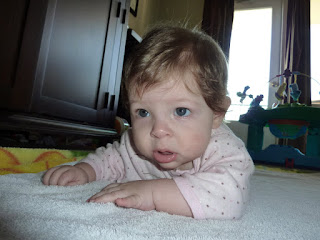Your baby may start showing signs of one of her first major emotional milestones — stranger anxiety. She may become clingy and anxious around new (and even familiar) people and may cry if a stranger suddenly approaches her.
Keep this in mind when you're around people she doesn't know, and try not to be embarrassed when she cries in someone else's arms — just take her back and calm her down by holding her yourself. Tell your friends and family to approach your little one with slow, gentle movements.
A case of stranger anxiety doesn't mean you have to avoid new faces. Your baby will benefit from being around people other than you and your partner. Just remember that she needs your patience and understanding to get through this very important stage of development.
Your baby's probably showing more signs that she's ready for solids — from a weaker tongue-thrust reflex (when your baby pushes out her tongue when something is placed on it) to a keener interest in the foods you and others are eating. But don't be in a rush to give your baby solid food. Discuss when to introduce solid food with your baby's healthcare provider.
Your baby's digestive system may not be ready for solids, and she might not be able control her chewing and swallowing muscles. (Don't worry: That will all come in a few weeks.) Giving your baby solid foods too early can raise her risk of developing food allergies, too. Common allergies include citrus, egg whites, peanut butter, wheat, shellfish, and cow's milk.
Use family mealtime to socialize with your baby. She'll enjoy watching you eat, and she may even eat more herself as a result. In another month or so, she'll be better able to sit up by herself and grasp small objects, too, adding to her dinner table skills.
Your baby may now be able to get into a sitting position from lying on her stomach by pushing up on her arms. If she's sitting independently, stay nearby for support — even if you provide pillows to cushion a possible fall. Your baby may have mastered the sitting skill, but she still might lose interest in being upright and topple over.
-BabyCenter.com








No comments:
Post a Comment
Drop us a line!